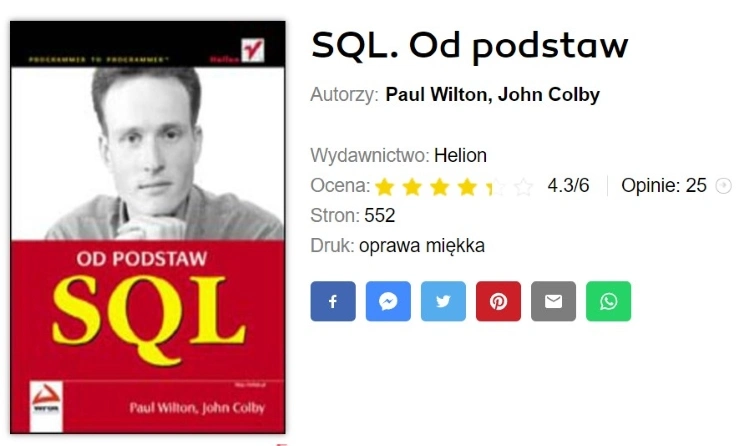Product managers in the IT industry are specialists whose experiences, knowledge, competencies, and skills (soft and hard) are often and eagerly used in technology companies.
What does a product manager do? What are the responsibilities of product managers? While announcing this article's topic and core content, we'll quickly answer this question by quoting Google Careers.
A product manager at Google (in the IT industry) combines multiple functions within the scope of their activities (work cross-functionally); they guide products from conception to launch.
They are a link between the technical world (programmers), user experience (UX/UI designers), and the business world (owners, shareholders).
More and more job offers for product managers are appearing. Associate Product Manager (APM) programs are also gaining popularity and importance. They introduce and prepare you for acquiring new competencies and allow you to start a new career path.
An excellent example of this is the Google APM program.
What are the most common responsibilities a product manager in the IT industry has?
What essential hard and soft skills (product manager skill set) must you possess to work successfully as a product manager?
What programming language should you choose, what technologies are worth mastering and following, and what technologies are worth learning?
What programming language should you choose to begin the journey with product management?
Is coding knowledge essential? Do you need to understand this technical stuff?
In just a moment, you will read about the best programming languages for product managers.
We highly recommend you read the article!
What is a product manager, and what do they do?
The definition of the product manager presented in the introduction to this article is naturally very general and vague.
We'll tell you more about this profession before we discuss the technical issues and expectations placed on product managers and describe the recommended programming languages for them.
We'll primarily write about the scope of operations, roles, benefits, and requirements that people in this job share.
What is a product manager (PM) in the IT industry? The article "Product Manager: The role and best practices for beginners" on the Atlassian blog provides a well-explained and illustrative definition.
According to Atlassian's definition, a product manager is a person that, above all:
- Identifies the needs, goals, and business expectations of the customer
- Determines the functions and the way the product works (collecting product requirements) that meet the needs of the customer
- Defines the measures of success and methods of evaluating success.
However, that's not all.
Product Managers' scope of responsibilities, tasks, and competencies is much broader and includes the following:
- Creating product strategy
- Collecting, analyzing, and synthesizing market quantitative and qualitative research
- Coordinating work, deadlines, flow, and circulation of information
- Determining use cases
- Optimizing already deployed functionalities
- Performing quality control
- Prioritizing the deployment of new functionalities
- Supporting marketing, promotional, and image-building activities
- Analyzing the competition and preparing benchmarks
- Diagnosing and evaluating the available and required resources
- Delegating tasks to teams
Product manager is a largely interdisciplinary profession that uses industry knowledge, methodologies, techniques, research, and ways of analyzing developed based on various sciences and approaches.
A product manager (IT product manager) supervises, develops, controls, supports, and coordinates the entire product life cycle.
Their task is to make the concepts, ideas, values, visions, plans, goals, and solutions a reality.
The following depends on the effectiveness of a PM:
- The market success of the product, primarily its competitiveness and innovativeness
- Profit, revenue, and financial stability
- The direction of the product development process
- Methods for validating the product's performance
- Ways of determining Key Performance Indicators
To face all of these tasks and expectations and to achieve the set objectives, it's necessary to have adequate competencies that, in the general sense, can be divided into the following:
- Soft (e.g., communicative and analytical skills and resistance to stress)
- Hard (e.g., command of programming languages)
In a guide (Guidance) published on the UK government website, the additional skills of the product manager were included; among the most important ones are:
- Knowledge of agile software development
- Ability to understand, take, and implement a perspective that is an intertwining of user-centered design, technology, and data-driven perspective (DDaT Perspective)
- Ability to work with limitations
- Ability to take a perspective related to the product life cycle (Life Cycle Perspective)
- Ability to implement the best practices into the development of a new digital product or digital service
- Ability to concentrate on the user.
Soft and hard skills play a significant role in the PM profession.
A rarely discussed matter is the possession by product managers of technical knowledge and skills that allow them to understand more deeply, reliably, and competently the entire process of creating, maintaining, and developing digital products.
Learning about technology is essential if you want to manage digital products and understand how they are created, how they work, and their capabilities and limitations.
What are technical skills? A product manager and programming
Technical skills are a type of competence that is easier to verify than soft skills.

Knowledge of a particular programming language can be tested, and its scope and level of advancement can be determined.
It's objective knowledge independent of external, contextual, or situational factors.
For example, the ability to communicate isn't easy to evaluate because, to a large extent, it depends on the following:
- Context
- Situation
- Composition (the number and diversity of interaction participants) and the course of interaction
- Goals
- Methods of evaluation
Soft skills are much more processual and subjective.
That's why it's better to take their possession on faith and give the benefit of the doubt than try to verify them unambiguously.
In the case of soft skills, their verifiability always revolves around the problem of adopted criteria and ways of evaluation.
Hard skills can be tested in a much more unbiased, objective, unambiguous, and credible way.
PMs are most often required to know (at least at the basic level) the following technologies, services, solutions, and tools:
- Programming languages (Python, Java, JavaScript, C++, HTML, SQL)
- CMS platforms
- Design programs (e.g., Figma)
- Cloud services
- Security systems
- Programs used to manage projects
Is this all that the market expects from a product manager? Of course not.
The essence of product management is the knowledge of user experience, technology, and business issues.
Martin Eriksson's article "What is a Product Manager?" persuasively discusses these relationships, particularly the dependencies and intertwining of business and technical issues related to user experience.
In his view, product management should primarily focus on achieving business objectives and maximizing the value of the digital product.
One of the most critical business objectives is optimizing the product's financial and business effectiveness. A PM can only achieve this objective if they know their product in depth.
First and foremost, knowledge about technology is knowledge about the product itself.
It's vital to be aware of how it's built, its range of possibilities and limitations, and its risk and success perspectives.
A product manager must have a mutual understanding of development, design, marketing, and software engineering teams or the ability to translate technical language into a more understandable one for stakeholders without such competencies.
This also results in many benefits related to:
- Business
- Quality
- Security
- The time of project execution
- Productivity
- The accuracy of the decisions made.
A PM also acts as a lawyer or representative of the future user in the process or project.
Product managers also aim to raise awareness about the specificity of end users' needs, behaviors, goals, capabilities, and expectations.
Knowledge of technology (jargon and coding) significantly facilitates understanding and communicating requirements, needs, and expectations.
Product managers who know programming languages and project management methodologies have an easier time communicating information when they share the same knowledge (at least at the basic level) with programmers.
Understanding how to program and guide development projects also allows you to be much more efficient when it comes to the following:
- Planning the work and creating schedules
- Planning budgets
- Diagnosing resources
- Solving problems (business, technical and organizational)
- Making critical decisions in a more informed and rational way and based on specific reasons
Coding for product managers: best programming languages
We have to emphasize that it isn't the role of product managers to do the programming for developers; it's only to understand their work conditions more profoundly. They don't necessarily need coding skills.

You shouldn't treat the knowledge of programming languages as the ability to create a digital product by yourself.
It's about understanding the programming language and, in particular, its:
- Semantics
- Syntactic rules — allowing you to build correct expressions
- Functions
- Applications
- Usefulness of libraries
- Types of supported data
- Compilation and interpretation of the source code.
If you understand the programming language, you'll also understand the following:
- Decisions
- Dilemmas
- Capabilities
- Limitations
- Structure and complexity
- Necessities
- Risks
Even when all these issues can't be deduced from the code, they're much easier to communicate if you use the same terms.
So much for theory, practice is much more unobvious for a simple reason.
Choosing the best programming languages is challenging, and finding a universal formula to help select the best language is hard.
With so many technologies choosing one over the other will always radiate excessive subjectivism.
The selection of the programming language should stem from the following:
- Needs and plans of the organization
- Used and offered technology stack
- Current and future usefulness and popularity of a given programming language
- Language learning curve (the speed with which you can acquire some proficiency in it)
- Availability in the open-source formula of the language itself and its libraries and frameworks
- Estimation of the size, engagement, and activity of the community that works on the development, optimization, and security of a given language
- The complexity of the syntax of a given language
- Already possessed experience in programming and learning programming languages
- The versatility of a particular language
- Availability of e-learning platforms, courses, university majors, and training that allow you to acquire new competencies
- Individual career goals
Nevertheless, it's possible to recommend languages that receive very high positions in various rankings.
It's possible to recommend programming languages that for years had huge popularity and are now a toolkit of programmers, a natural element of the technology stack in most web development companies.
So, what programming languages should product managers learn?
JavaScript for product managers
Knowledge of one of the most popular programming languages in the tech industry seems obvious. The probability of its use in projects is more than high.
Customers are very familiar with JavaScript and value its advantages. It's been extremely popular among developers for years.
For the past nine years, JavaScript has ranked first in the most often used programming languages category in the Developer Survey, which is regularly conducted by the Stack Overflow platform.
It's a worldwide trend. JavaScript programmers are among the most sought-after on the job market.

JavaScript is a very versatile language, although initially, there was no indication that it would go beyond its very narrow scope of application.
Currently, JavaScript is used to create web and desktop applications as well as online games.
However, it's most often used to develop websites and web applications. When it comes to the front-end layer, it's the language of first choice.
The immense popularity of JavaScript has created a very active and numerous community around it that actively creates new frameworks, libraries, and code editors.
When it comes to learning this language, you'll also be able to find an almost infinite number of paid and free courses, university majors, boot camps, books, video tutorials, and online forums.
JavaScript offers a few conveniences for people just starting to learn to code. Above all, you don't need to configure a programming environment to start coding.
Learning JavaScript is an excellent introduction to learning other languages, such as Python.
Python for product managers
Python gains significance and popularity year after year, and it's the next programming language eagerly recommended for product managers.

For several years and in various rankings conducted locally and globally, it has ranked among the top languages that are:
- Used in projects
- Liked
- Recommended
- Developed.
In the TIOBE Index, Python was selected as the programming language of the year in 2020.
Python is often and eagerly used to create websites and web and desktop applications, as well as for machine learning and the Internet of Things. This technology is used in the medical, financial, and marketing industries.
Python is relatively easy to learn, or at least easier than other popular languages. Its simple syntax, which is sometimes compared to the syntax of the English language, makes learning the basics of Python relatively easy.
Very readable and clear code based on the DRY (Do Not Repeat Yourself) method allows you to write applications faster, simpler, and more perfectly.
Unlike compiled languages, Python enables you to launch every line of the code just after finishing writing it, allowing you to see the effect and obtain feedback immediately.
From an educational point of view, it's a precious advantage. The vast community gathered around Python is also a great benefit. It continuously creates, develops, and refines new frameworks, libraries, and learning paths.
SQL for product managers
Structured Query Language (SQL) is another popular programming language worth recommending for product managers. SQL is a standard language used to operate relational databases.
Why is it important to learn it? Data has become a very significant and precious resource because we live in a world of data. SQL is a language used to create and modify databases and download, enter, update, and delete records from databases.

Simply put, SQL is used to download, manage, and access data stored in databases. This can be achieved through simple queries.
SQL has a relatively approachable structure and simultaneously allows you to perform complex queries. Knowledge of SQL enables you to understand the architecture of databases better and more in-depth.
It allows you to formulate more accurate queries and obtain more reliable and precise answers.
A product manager can use the knowledge and experience gained while learning SQL to communicate daily with developers and software engineers.
Product managers often use spreadsheets to perform various data operations. Thanks to their knowledge of SQL, they can perform some tasks faster and more efficiently.
Learning SQL is recommended for product managers for several reasons. Above all, proficiency in SQL allows you to:
- Extract data from data sets
- Deepen your understanding of the operation of applications used in daily work
- Work "with" and "on" data from various sources (e.g., e-commerce, social media)
- See trends
- Analyze data more reliably
- Develop strategies based on various types of data
- Consolidate data from different sources.
The best programming languages for product managers. Summary
- What are the responsibilities of product managers? IT product manager usually guides products from conception to launch.
- A PM is a link between the technical world (programmers), user experience (UX/UI designers), and the business world (owners, shareholders).
- A product manager identifies the customer's needs, goals, and business expectations, determines the product's function and how it works and indicates success measures and methods for success evaluation.
- What requirements should a PM meet? Technical product managers (especially certified product managers) are an interdisciplinary profession that uses knowledge, methodologies, techniques, research, and analyzing methods developed based on various sciences and approaches. They're very sought-after in the IT industry.
- Product managers supervise, develop, control, support, and coordinate the product life cycle.
- The effectiveness of a product manager influences the product's market success, profits, revenues, financial stability, direction of product development, reliability and accuracy of defining and validating achievements and failures, and testing of product performance.
- In the profession of product manager, soft and hard skills play an equally important role.
- Technical skills are a type of competence that is easier to verify than soft skills.
- Knowledge of a particular programming language can be tested, and its scope and level of advancement can be determined. It's objective knowledge independent of external, contextual, or situational factors.
- Soft skills' verifiability always revolves around the problem of adopted criteria and evaluation methods.
- Hard skills can be tested in a much more unbiased, objective, unambiguous, and credible way.
- First and foremost, knowledge about technology is knowledge about the product itself. It's vital to be aware of how it's built, its range of possibilities and limitations, and its risk and success perspectives.
- The ability to transfer technical language into a more understandable one for stakeholders is crucial for a PM.
- Product managers also aim to raise awareness about the specificity of end users' needs, behaviors, goals, capabilities, and expectations.
- Knowledge of technologies considerably facilitates understanding and communicating requirements, needs, and expectations.
- Understanding a programming language allows you to understand more profoundly the decisions, dilemmas, possibilities, limitations, structures, complexity, necessities, and risks that appear before developers and designers.
- Coding courses can help you achieve the necessary level of technical understanding.
- The choice between the best programming languages is challenging.
- It's possible to recommend languages that have gained high positions in various rankings, are considerably popular, and are a toolkit of competencies for programmers.
- JavaScript has been extremely popular for years.
- JavaScript is a very versatile language. It's currently used to create web and desktop applications and online games.
- When it comes to the front-end layer, it's the language of first choice.
- The immense popularity of JavaScript has created a very active and numerous community around it that actively creates new frameworks, libraries, and code editors.
- Python, in all types of rankings for several years, has been among the top languages used in projects, recommended, and actively developed by the community.
- Python is considered a relatively simple language to learn. The simple syntax makes learning the basics of Python relatively easy.
- Structured Query Language is another popular programming language worth recommending for product managers.
- Data has become a very significant and precious resource. SQL is a language used to create and modify databases and download, enter, update, and delete records from them.
- It allows you to formulate more accurate queries and obtain more reliable and precise answers.
- A product manager can use the knowledge and experience gained while learning SQL to communicate daily with technical teams.







